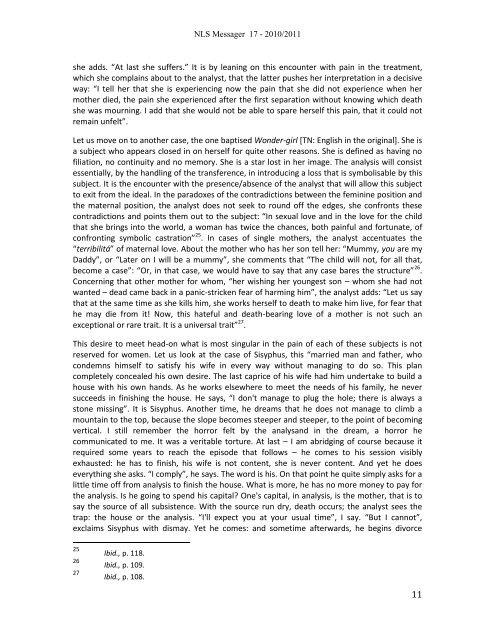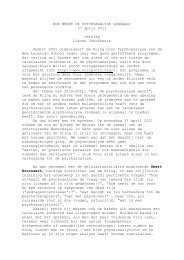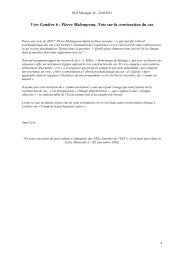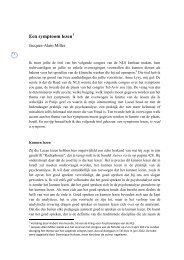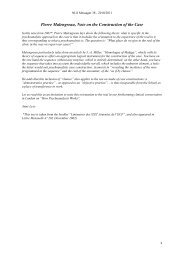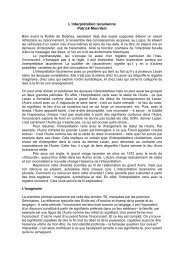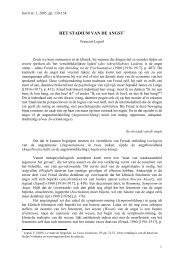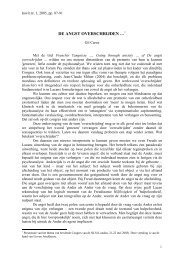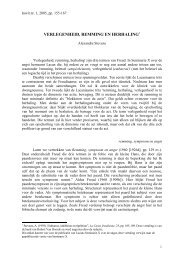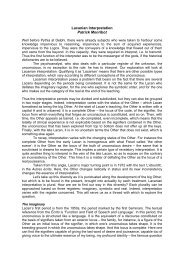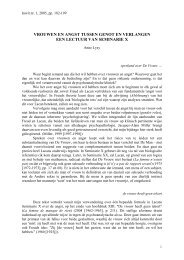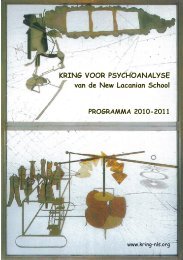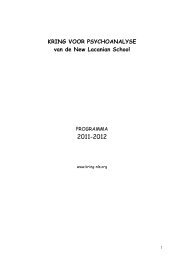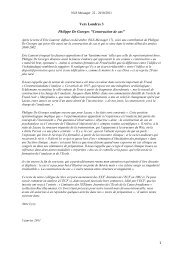Vers Londres 2 Eric Laurent, « Le cas, du - Psychoanalyse Lacan ...
Vers Londres 2 Eric Laurent, « Le cas, du - Psychoanalyse Lacan ...
Vers Londres 2 Eric Laurent, « Le cas, du - Psychoanalyse Lacan ...
Create successful ePaper yourself
Turn your PDF publications into a flip-book with our unique Google optimized e-Paper software.
NLS Messager 17 - 2010/2011<br />
she adds. “At last she suffers.” It is by leaning on this encounter with pain in the treatment,<br />
which she complains about to the analyst, that the latter pushes her interpretation in a decisive<br />
way: “I tell her that she is experiencing now the pain that she did not experience when her<br />
mother died, the pain she experienced after the first separation without knowing which death<br />
she was mourning. I add that she would not be able to spare herself this pain, that it could not<br />
remain unfelt”.<br />
<strong>Le</strong>t us move on to another <strong>cas</strong>e, the one baptised Wonder-girl [TN: English in the original]. She is<br />
a subject who appears closed in on herself for quite other reasons. She is defined as having no<br />
filiation, no continuity and no memory. She is a star lost in her image. The analysis will consist<br />
essentially, by the handling of the transference, in intro<strong>du</strong>cing a loss that is symbolisable by this<br />
subject. It is the encounter with the presence/absence of the analyst that will allow this subject<br />
to exit from the ideal. In the paradoxes of the contradictions between the feminine position and<br />
the maternal position, the analyst does not seek to round off the edges, she confronts these<br />
contradictions and points them out to the subject: “In sexual love and in the love for the child<br />
that she brings into the world, a woman has twice the chances, both painful and fortunate, of<br />
confronting symbolic <strong>cas</strong>tration” 25 . In <strong>cas</strong>es of single mothers, the analyst accentuates the<br />
“terribilitá” of maternal love. About the mother who has her son tell her: “Mummy, you are my<br />
Daddy”, or “Later on I will be a mummy”, she comments that “The child will not, for all that,<br />
become a <strong>cas</strong>e”: “Or, in that <strong>cas</strong>e, we would have to say that any <strong>cas</strong>e bares the structure” 26 .<br />
Concerning that other mother for whom, “her wishing her youngest son – whom she had not<br />
wanted – dead came back in a panic-stricken fear of harming him”, the analyst adds: “<strong>Le</strong>t us say<br />
that at the same time as she kills him, she works herself to death to make him live, for fear that<br />
he may die from it! Now, this hateful and death-bearing love of a mother is not such an<br />
exceptional or rare trait. It is a universal trait” 27 .<br />
This desire to meet head-on what is most singular in the pain of each of these subjects is not<br />
reserved for women. <strong>Le</strong>t us look at the <strong>cas</strong>e of Sisyphus, this “married man and father, who<br />
condemns himself to satisfy his wife in every way without managing to do so. This plan<br />
completely concealed his own desire. The last caprice of his wife had him undertake to build a<br />
house with his own hands. As he works elsewhere to meet the needs of his family, he never<br />
succeeds in finishing the house. He says, “I don't manage to plug the hole; there is always a<br />
stone missing”. It is Sisyphus. Another time, he dreams that he does not manage to climb a<br />
mountain to the top, because the slope becomes steeper and steeper, to the point of becoming<br />
vertical. I still remember the horror felt by the analysand in the dream, a horror he<br />
communicated to me. It was a veritable torture. At last – I am abridging of course because it<br />
required some years to reach the episode that follows – he comes to his session visibly<br />
exhausted: he has to finish, his wife is not content, she is never content. And yet he does<br />
everything she asks. “I comply”, he says. The word is his. On that point he quite simply asks for a<br />
little time off from analysis to finish the house. What is more, he has no more money to pay for<br />
the analysis. Is he going to spend his capital? One's capital, in analysis, is the mother, that is to<br />
say the source of all subsistence. With the source run dry, death occurs; the analyst sees the<br />
trap: the house or the analysis. “I'll expect you at your usual time”, I say. “But I cannot”,<br />
exclaims Sisyphus with dismay. Yet he comes: and sometime afterwards, he begins divorce<br />
25<br />
26<br />
27<br />
Ibid., p. 118.<br />
Ibid., p. 109.<br />
Ibid., p. 108.<br />
11


